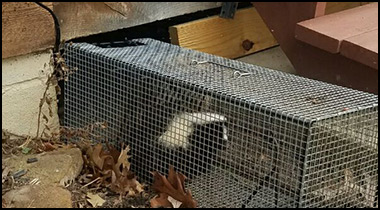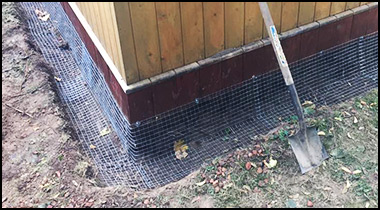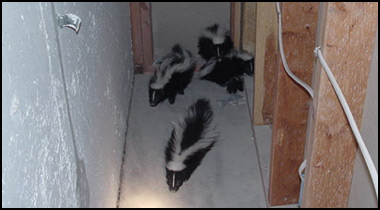Newark Skunk Removal Resources
Skunk Rehabber - Charles H. Rogers Wildlife Refuge: (609) 924-5704
Free Essex County Animal Services: (973) 966-5751
Humane Wildlife Trappers of Newark: 973-607-2206
If you need skunk control in Newark, you have a few options. First, you can attempt to solve the skunk problem yourself by reading our do-it-yourself guide. If you need outside help, you can also call Essex County Animal Services to see if they have any free resources or help for you - however, they primarily deal with dog and cat concerns. You can also call a local Newark wildlife rehabber, as they are typically a great resource for advice that is in the best welfare of the animal. If as a last resort you must hire a professional company, we recommend Humane Wildlife Trappers of Newark at 973-607-2206. To learn more about them or check their skunk removal prices, visit newarkpestanimal.com.

Newark Skunk Trapping and Removal

Preventative Repairs & Exclusion

Newark Skunk Removal From Structures
In many cases, preventative measures can solve your Newark skunk problem - keep garbage secured, pet food indoors, and most of all when it comes to skunks, secure the perimeter of your shed, porch, deck, or house with a barrier - lattice or steel mesh is good, and it keeps New Jersey skunks from going under the structure. If trapping and removal of the skunk is the only option you have, please do so with the help of a local agency or professional company who knows how to do it humanely and legally. Browse the resources of this site for more educational information.
Frequently Asked Questions:
Prevention: How to Keep Skunks Away
What to do with a skunk after I catch it?
Is it legal for me to trap a skunk?
How to remove skunk odor
Is a skunk active during the daytime rabid?
What does skunk feces look like?
Newark Skunk Control Information: Myths on skunk repellants
You can find a remedy for just about anything on the internet these days. This does not exclude animal repellant. There are a wide variety of ideas, theories, and methods when it comes to trying to repel specific animals.
One of the biggest pests' people want to repel are skunks. Skunks are not aggressive animals, however, everyone knows a skunk by its dreadful odor. Those little stinkers can be smelled from over a mile away. They can also be detected around your property, even though you might not see them. Skunks are nocturnal animals, so during the day they try to stay out of the sun-though not always.
You can tell a skunk might have a den in or around your property but the faint smell that is present with them. It is always lingering. It might not be strong as a direct spray, but the closer you get to the den, the smell is more likely to be stronger.
One of the myths of repelling skunks is using mothballs. This doesn't work. Mothballs have chemicals in them and can be dangerous and lethal to skunks if they are ingested. In fact, so much so, that using mothballs as a means to repel skunks is illegal in some states.
Skunks are non-aggressive animals. They prefer to keep to themselves. They only spray when they are anger or feel as if they are being threatened.
Another myth that people will say works with repelling skunks is ammonia. This is a popular method and myth when people are trying to rid themselves of these little pests. However, while the ammonia is incredibly strong and may offend the extremely sensitive noses of these little critters, this won't work outside of a day, possibly two.
When putting ammonia on a rag or cotton ball on, in or around the dens and surrounding areas, it will create a noxious. The downside is that only after a couple of days, the ammonia will begin to evaporate. Once the chemical has evaporated, the skunk will be back. They are nothing if not persistent.
They will come back to the sight of their dens each and every day until the scent is no longer there. Then you are right back to the smelly square one-unwanted visitors that are in no hurry to leave. There are safer and effective methods on the market today
Remember, for free services you can try (609) 924-5704 or (973) 966-5751, but if you need to pay for professional help, check the prices at the newarkpestanimal.com website. Or follow our do-it-yourself guide!

